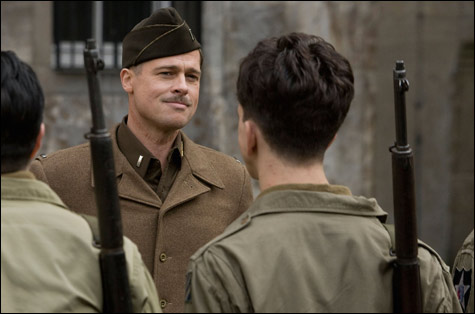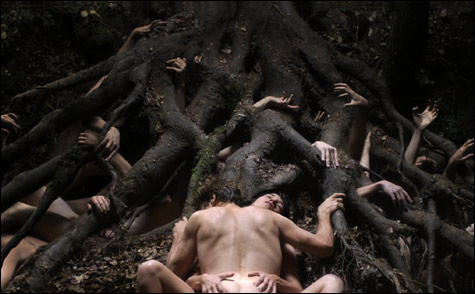
INGLOURIOUS BASTERDS: Is Quentin Tarantino’s new movie a Jewish revenge fantasy? And what’s with the title spelling? |
Quick — name a world-class film-festival administrator willing to reveal that at age 12 he was titillated by the sight of clodhopper-shod Minnie Mouse stomping on Mickey's tail in a French comic book.
Answer: Gilles Jacob, president of the Festival de Cannes. A vital cog in the Cannes machinery since 1976, Jacob, now 79, relays this tidbit in his recently published autobiography. He also tells readers that he learned of his promotion to Cannes programmer while in the buff opposite a comparably non-attired Minister of Culture in a locker room after a tennis match.
I could be mistaken, but I don't think Sundance or Tribeca brass do their negotiating in the nude.
Ergo, France is different. Cannes is different.
There is nothing remotely Mickey Mouse about Cannes. Without proper accreditation, your chance of getting in to see a film at the world's most prominent film festival is about equal to your prospects of skinny-dipping with Brad Pitt and Angelina Jolie. Cannes, whose 62nd edition ran May 13 through 24, is a closed trade show for cinema professionals.
Yes, there's a red carpet, evening screenings require formal garb, attractive actors and famous directors wave to the crowds, and success or failure is magnified by the concentration of journalists from every nation with enough fabric to fly a flag. But the outside world's impression that it is an unrelentingly "glamorous" event is seriously skewed. Cannes is not glamorous. There, I've said it.
It's grueling and exciting. If you're trying to see the more than 100 films that make up the festival's offerings, it's grueling and exhausting. If you're trying to buy or sell some of those films, it's grueling and . . . you get the idea.
Is Cannes a nifty place to premiere a film, say one to which you've devoted eight years? As Quentin Tarantino put it: "For me, there's no place like Cannes for cinema on the face of the Earth. During this time on the Riviera, cinema matters, it's important. Everybody sees the movie at the exact same time. I make movies for the planet Earth, and Cannes is the place that represents that."

ANTICHRIST: The squirm-inducing scenes in Lars von Trier’s film have been trumpeted out of context. |
The United Nations probably hasn't considered this, but Tarantino may be an untapped tool for cross-cultural harmony. How many other filmmakers could motivate 2000 persons of all shapes and sizes, colors, ages, and nationalities to get up at the crack of dawn to sprint up steep stairs for the world premiere of a movie at 8:30 in the morning?
Like happy zombies who feed on celluloid, we streamed toward the Palais des Festivals on May 20 to commune in the dark at the world premiere of Inglourious Basterds. (That spelling, by the way, is never really explained.) The film — in which German characters speak German (and French and English) and French characters speak French (and German and English) and Americans speak, uh, English — is a smart plea for linguistic versatility.
Best Actor winner Christoph Waltz — who graciously accepted his prize in three languages — plays brilliant Nazi colonel Hans Landa, a/k/a "the Jew hunter." The 52-year-old Austrian has been acting, mostly on German-language television, for 30 years. As he did for John Travolta 15 years ago, Tarantino has put a taken-for-granted actor in the spotlight.
Is Basterds a Jewish revenge fantasy? "That wouldn't be the section of the video store I'd put it in," Tarantino said, while acknowledging that the description has a great deal of truth to it.
Eli Roth, the Hostel writer/director who plays the hulking so-called Bear Jew, has that video-store shelf in his head: "Being Jewish, for me this is like kosher porn. I've dreamed of something like this since I was a little kid. I performed a sex scene when I beat that guy to death."
Many, many other actors this year performed in sex scenes not involving baseball bats but incorporating everything from standard appendages to, oh, rusty farm tools.
Best Actress winner Charlotte Gainsbourg, mourning opposite Willem Dafoe over the loss of their unnamed characters' only child, skips the Prozac and borrows a few techniques from the Spanish Inquisition in an extreme effort to subdue recalcitrant grief in Lars von Trier's Antichrist. The squirm-inducing scenes have been trumpeted out of context; Trier has fashioned a magnificently shot portrait of a loving relationship made untenable by insurmountable sorrow.
Gaspar Noe, who worked wonders on the topic of damaged coupledom in 2002's Irreversible, delivers gobs of groovy camerawork and rice-paper-thin content in Enter the Void, the semi-psychedelic tale of a wandering soul whose corporeal shell didn't get to finish reading The Tibetan Book of the Dead before being prematurely dispatched in a Tokyo restroom. Thanks to Noe, women wondering what their cervixes see when a penis comes to call need no longer figure out how to light their vaginas from within.